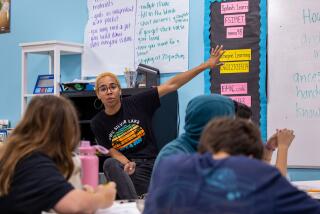Kentucky Educators Brainstorming a New Pedagogy
- Share via
OWENSBORO, Ky. — All children in Daviess County’s elementary schools got piano lessons this year. The idea was to build up brains, not strictly to make music.
For the same reason, students began learning to play chess and were regularly exposed to the visual and performing arts. Kindergarten children were taught their ABCs in Spanish as well as English.
Everything was calculated to increase neuron connections--literally, pathways in the brain--for learning and remembering.
“We’re not trying to produce 10,000 musicians. We’re not trying to produce 10,000 foreign linguists. We’re trying to make connections,” school Supt. Stuart M. Silberman said.
Daviess County based its elementary curriculum on research showing that each activity enhances brain development in childhood, the only stage of life at which some kinds of learning can happen. It apparently is among a handful of districts in the nation doing so.
For piano classes, there are new music labs with Yamaha keyboards in each of the district’s 12 elementary schools. Instruction in a foreign language begins in kindergarten. There are artists in residence.
“It’s a physiological project with a common-sense approach. We know it’s going to have a major impact on achievement and capacity to learn,” Silberman said.
The project, named Graduation 2010, was born in a brainstorming session two years ago, when Silberman and other administrators floated ideas about how to increase student achievement.
Some in the group delved into brain research and came up with concepts. The county school board signed on. Two hundred people later came to a town meeting, at which committees were formed to turn the concepts into action plans. Corporate sponsors and a local charity, the Hager Foundation, agreed to help underwrite it.
The project covers all elementary grades, which enroll 4,200 of the district’s 10,000 students. But the kindergarten children of the school year just completed, the high school class of 2010, are the center of attention.
A Western Kentucky University research team plans to study them for the next 12 years. It will look for ways in which their achievement is affected by the project, including its early, massive doses of music, art and foreign language.
There also is intensive reading instruction through the first three grades, in-depth health screenings of all children, an emphasis on nutrition and various initiatives to increase community and parental involvement in schools.
Gayle Ecton, an education professor who heads the team, said effects might be seen in scores on state assessments and college entrance exams and in the percentage of students applying for college.
Pat Ashley, principal of Deer Park Elementary School, said nothing was dropped from the traditional curriculum. It was only enhanced by adapting medical research to teaching.
Spanish was introduced in kindergarten because a young child has a unique facility for foreign language. A section of the child’s brain stores the knowledge, complete with accent. But the connection must be made in time, because the window closes about age 10.
“Languages learned after that age are substantially more difficult,” said Kathie Nunley, who is part of a brain research team at the University of Utah. “However, education continues to introduce foreign language in junior high. . . . We are trying to drag education into the world of psychological research, but it is a slow crawl.”
David A. Sousa, a science and education consultant in Plainfield, N.J., said educators had little information to work with until recently.
For example, he said, “we have very much underestimated the power of music.” Music is rhythm and timing. If children learn music at an early age, “it helps them with arithmetic later on.”
By the same token, art stimulates parts of the brain that foster creativity. But when school budgets get tight, music and art are among the first classes to be cut, Sousa said.
A year ago, Sousa was brought in to help train Daviess County teachers and administrators. He told them: “You can’t think of music and art as frills anymore.”
Silberman was already sold. He said he had noticed years earlier, when teaching high school chemistry and physics in Chattanooga, Tenn., that the brightest students all seemed to be in the band.
More to Read
Sign up for Essential California
The most important California stories and recommendations in your inbox every morning.
You may occasionally receive promotional content from the Los Angeles Times.













